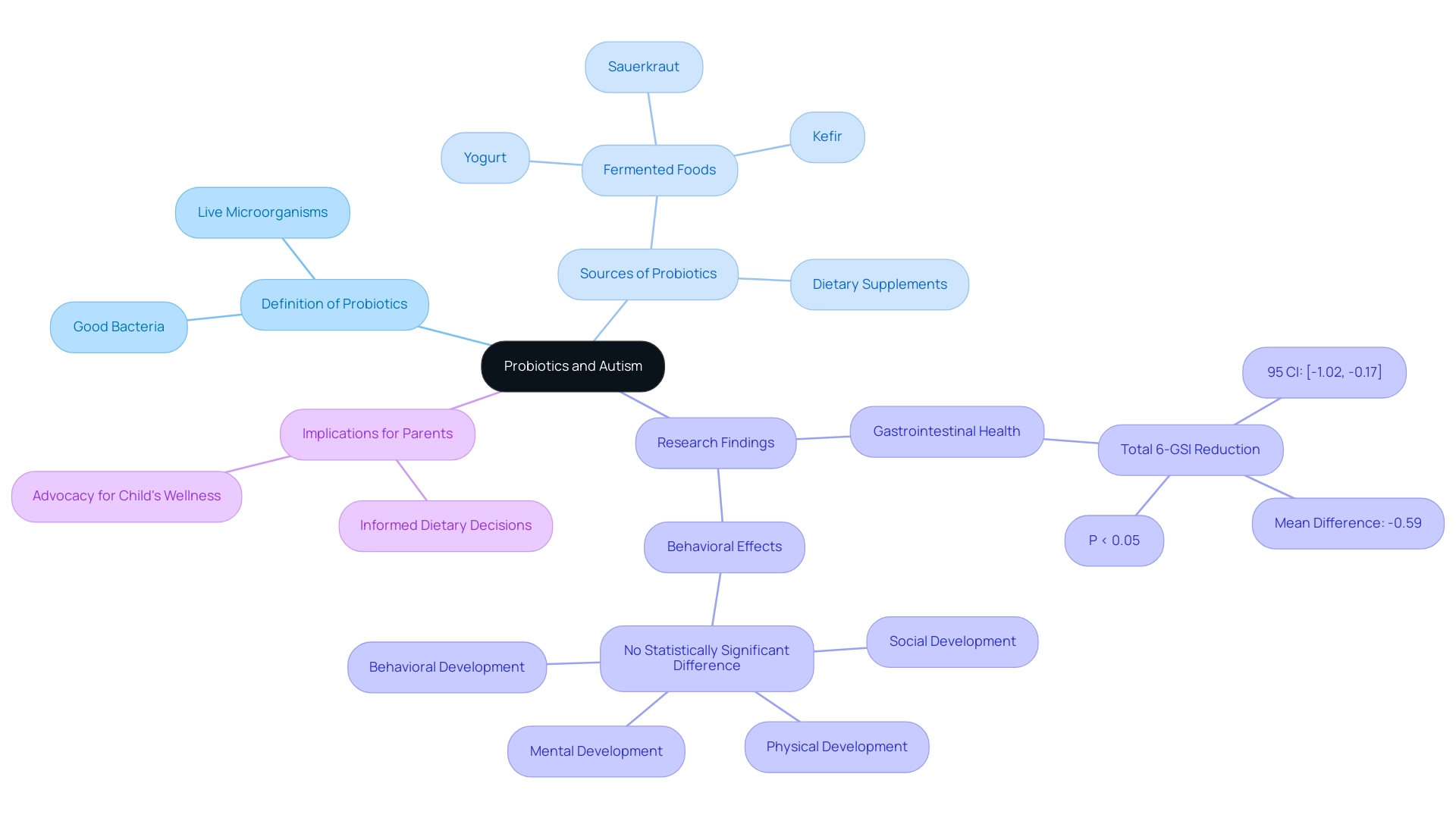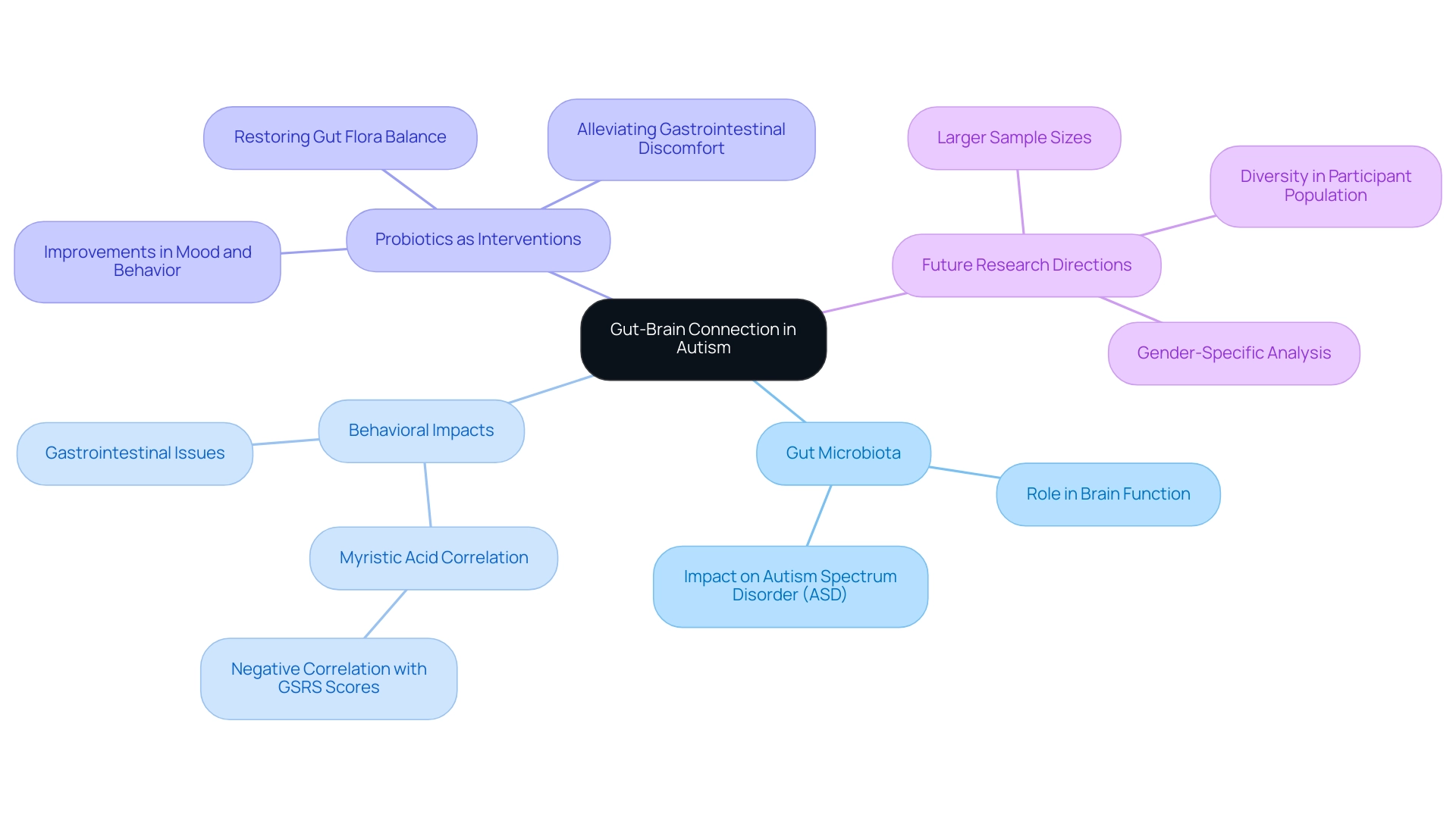Overview
Probiotics may offer potential benefits for individuals with Autism Spectrum Disorder (ASD) by improving gastrointestinal health and possibly influencing behavior and mood. The article supports this by presenting research findings that indicate probiotics can alleviate gastrointestinal issues in ASD youth, although it notes that the effects on behavioral symptoms are less clear, emphasizing the need for individualized approaches to treatment.
Introduction
In the quest for improved health and well-being for children on the autism spectrum, probiotics have emerged as a promising avenue worth exploring. These beneficial microorganisms, often found in fermented foods and supplements, have been linked to various health benefits, particularly in enhancing gastrointestinal function—a crucial aspect for many children with Autism Spectrum Disorder (ASD).
Recent research suggests that by addressing gut health, probiotics may not only alleviate digestive issues but also positively influence behavior and mood. As parents navigate the complexities of autism, understanding the role of probiotics can empower them to make informed dietary choices that support their child's unique needs.
This article delves into the science behind probiotics, the gut-brain connection, and practical tips for integrating these beneficial bacteria into daily routines, providing valuable insights for advocates seeking to champion their child's health and development.
Introduction to Probiotics and Their Role in Autism
Probiotics, frequently called 'good' bacteria, are live microorganisms that can provide numerous benefits when incorporated into our diets. These beneficial microbes are predominantly found in fermented foods such as yogurt, kefir, and sauerkraut, as well as in various dietary supplements. Recent research suggests that probiotics for autism may provide considerable potential in addressing issues related to Autism Spectrum Disorder (ASD) by improving gastrointestinal health and possibly affecting behavior and mood.
For example, a comprehensive review and meta-analysis indicated that supplementation with beneficial bacteria enhanced gastrointestinal issues in youth with ASD, with a notable reduction in Total 6-GSI following oral intake of the supplements, demonstrating a mean difference of -0.59 (95% CI [-1.02, -0.17], P < 0.05). This highlights their importance in overall well-being. As Amirhossein Sahebkar observes, 'This analysis not only validates the role of beneficial bacteria in enhancing ASD manifestations but also highlights the necessity for individualized therapy.'
Moreover, a systematic review titled 'Probiotics Treatment and ASD Youth' examined the impacts of probiotics for autism on individuals with Autism Spectrum Disorder, concentrating on gastrointestinal symptoms, and discovered that while probiotics for autism alleviated these symptoms, it presented no statistically significant difference in behavioral, social, physical, and mental growth in ASD individuals. As a parent advocate, understanding the basics of probiotics can enable you to make informed dietary decisions that promote your offspring's well-being and growth. Grasping these insights not only provides you with knowledge but also allows you to advocate effectively for your child's unique wellness needs.

Exploring the Gut-Brain Connection in Autism
The gut-brain connection represents a vital communication pathway between the gastrointestinal system and the brain, significantly influencing overall wellness and behavior. Recent research highlights that gut microbiota plays a pivotal role in brain function, particularly for individuals on the autism spectrum, where probiotics for autism may help address frequently reported gastrointestinal issues. These challenges can intensify behavioral symptoms, making it essential to address gut health.
For instance, studies have shown that myristic acid levels correlate negatively with behavioral assessments (r = -0.3, p = 0.01), indicating that disturbances in gut bacteria may directly affect behavior. However, it is important to acknowledge the limitations of current research, including modest sample sizes and a lack of diversity, which may restrict the generalizability of findings. Probiotics for autism are emerging as a beneficial intervention, helping to restore balance to gut flora, which can alleviate gastrointestinal discomfort and lead to improvements in mood and behavior.
As Enrico Domenici, a prominent researcher in this area, emphasizes, acquiring a thorough understanding of this connection is crucial for parents seeking holistic support strategies for their offspring. This knowledge not only empowers parents but also equips them with tools to advocate effectively for their offspring's well-being. Future studies should aim for larger, more diverse samples and consider gender-specific analysis to better understand the relationship between gut microbiota and ASD.

Benefits of Probiotics for Autism: Evidence and Insights
Emerging research highlights several promising benefits of probiotics for autism in children, particularly in areas such as gastrointestinal health, anxiety reduction, and social behaviors. A systematic review of 12 randomized controlled trials involving 630 patients revealed that certain probiotics for autism could potentially assist in alleviating issues such as irritability and hyperactivity. While the results were varied—some studies highlighted positive effects—overall, the evidence does not offer a clear endorsement of supplements as a standalone intervention for autism challenges.
As Amirhossein Sahebkar aptly noted,
There is mounting evidence that gut microbiota play a major role in neurological and behavioral disorders, such as ASD, which is why this issue is becoming increasingly important.
Notably, a Swedish population-based cohort study involving over 1,000,000 individuals has further underscored the significance of gut health in relation to autism. As we approach 2024, recent clinical studies continue to investigate how probiotics for autism may alleviate anxiety in youngsters, with some statistics indicating a notable reduction in anxiety symptoms among those treated.
It is also essential to acknowledge Prof. Mohsen Saleh Elalfy for providing the full manuscript of his work, which has contributed to the ongoing dialogue in this field. Given this landscape of research, it's crucial for parents to engage with healthcare professionals to identify the most suitable probiotics for autism tailored to their offspring's unique needs, ensuring that any integration of these into their treatment plan is both informed and effective.
Safety and Side Effects of Probiotics in Autism Treatment
There is growing interest in probiotics for autism due to their potential advantages, especially for individuals with autism spectrum disorders. While they are generally regarded as safe, it is crucial to be aware of possible side effects. Mild gastrointestinal discomfort, bloating, or gas can occur, especially when introducing probiotics.
To mitigate these effects, it's advisable to start with smaller doses and carefully monitor the individual's response. Consulting with healthcare providers before initiating any supplement is essential, particularly if your child has existing health conditions. As noted by YBN, a staff member of the World Health Organization:
- "The authors alone are responsible for the views expressed in this article, and they do not necessarily represent the views, decisions, or policies of the institutions with which they are affiliated."
This proactive approach empowers parents to navigate the complexities of these supplements, ensuring that they are well-informed about both the benefits and risks associated with them. Notably, the risk of bias was assessed in 98 studies on probiotics, with 14 studies showing a high risk for the duration of diarrhea outcome. Furthermore, case studies such as "Psychoneurological Symptoms and Gut Microbiota" demonstrate that intestinal microbial dysfunction has been associated with psycho neurological issues like anxiety and depression in pediatric oncology patients.
Probiotics for autism may help alleviate these symptoms, improving emotional well-being and overall quality of life for young patients undergoing treatment for ALL. By taking these precautions, you can make confident decisions that prioritize your offspring's health and well-being.
Choosing and Incorporating Probiotics: Practical Tips for Parents
Choosing the appropriate beneficial bacteria for your offspring entails more than simply grabbing any supplement from the shelf. Focus on products that specifically contain strains such as Lactobacillus and Bifidobacterium, which are considered probiotics for autism and have been studied for their potential benefits in autism spectrum disorders. The inclusion of probiotics for autism is particularly relevant, as they are known to reduce chronic inflammation, a condition often seen in individuals with autism.
It's crucial to meticulously read labels, ensuring the product lists live cultures and hasn't surpassed its expiration date, as potency is key to effectiveness. Begin incorporating probiotics gradually into your offspring's diet—try starting with yogurt or blending them into smoothies. This gradual introduction allows you to monitor how your offspring responds, making adjustments as necessary.
Collaborating closely with your healthcare provider is crucial; they can assist in tailoring the approach based on your individual's unique needs and circumstances. As Paul Wang, Developmental Pediatrician and Head of Medical Research at Autism Speaks, states, 'The research that Dr. Williams and his colleagues are pursuing is an important next step.' This highlights the ongoing efforts to understand the complexities of autism and the importance of probiotics for autism.
However, it's important to note that findings from mouse studies cannot be directly applied to humans due to significant differences between mouse and human microbiomes and brain structures. By following these steps, you can empower yourself as an advocate for your child's health, making informed choices that support their overall well-being.

Conclusion
Probiotics represent a powerful tool in the ongoing journey of supporting children on the autism spectrum. With their ability to enhance gastrointestinal health and potentially influence behavior and mood, these beneficial microorganisms can play a significant role in improving the overall well-being of children with Autism Spectrum Disorder (ASD). Research highlights that probiotics can alleviate digestive issues, which are frequently reported among children with ASD, thereby contributing to a more balanced emotional state and improved social behaviors.
Understanding the gut-brain connection further reinforces the importance of probiotics in this context. As studies indicate, the balance of gut microbiota is crucial for brain function, and addressing gastrointestinal health can lead to positive behavioral outcomes. While the evidence is still evolving, parents can take proactive steps by consulting healthcare professionals to identify appropriate probiotic strains tailored to their child's unique needs.
As with any health intervention, safety is paramount. Parents are encouraged to introduce probiotics gradually and remain vigilant regarding any potential side effects. Engaging in open discussions with healthcare providers ensures that the incorporation of probiotics is informed, safe, and effective.
Ultimately, empowering oneself with knowledge about probiotics fosters advocacy for a child's health and development. By making informed dietary choices and collaborating with medical professionals, parents can champion their child's journey towards improved health, paving the way for a brighter future.
Frequently Asked Questions
What are probiotics and where can they be found?
Probiotics, often referred to as 'good' bacteria, are live microorganisms that can provide health benefits when included in our diets. They are primarily found in fermented foods such as yogurt, kefir, and sauerkraut, as well as in various dietary supplements.
How do probiotics relate to Autism Spectrum Disorder (ASD)?
Recent research suggests that probiotics may have potential benefits for individuals with Autism Spectrum Disorder by improving gastrointestinal health and potentially influencing behavior and mood.
What evidence supports the use of probiotics for gastrointestinal issues in youth with ASD?
A comprehensive review and meta-analysis indicated that supplementation with beneficial bacteria improved gastrointestinal issues in youth with ASD, showing a significant reduction in Total 6-GSI after oral intake of the supplements.
Did probiotics show any significant effects on behavioral, social, physical, and mental growth in individuals with ASD?
While probiotics alleviated gastrointestinal symptoms in individuals with ASD, a systematic review found no statistically significant difference in behavioral, social, physical, and mental growth.
Why is understanding probiotics important for parents of children with ASD?
Understanding the basics of probiotics can help parents make informed dietary decisions that promote their child's well-being and growth, enabling them to advocate effectively for their child's unique wellness needs.
What is the gut-brain connection and its significance for individuals with ASD?
The gut-brain connection is a vital communication pathway between the gastrointestinal system and the brain, influencing overall wellness and behavior. For individuals on the autism spectrum, addressing gut health may help alleviate gastrointestinal issues that can exacerbate behavioral symptoms.
What are some limitations of current research on probiotics and ASD?
Current research has limitations such as modest sample sizes and a lack of diversity, which may restrict the generalizability of the findings regarding the effects of probiotics on individuals with ASD.
What future research directions are suggested for studying probiotics and ASD?
Future studies should aim for larger, more diverse samples and consider gender-specific analyses to better understand the relationship between gut microbiota and Autism Spectrum Disorder.




